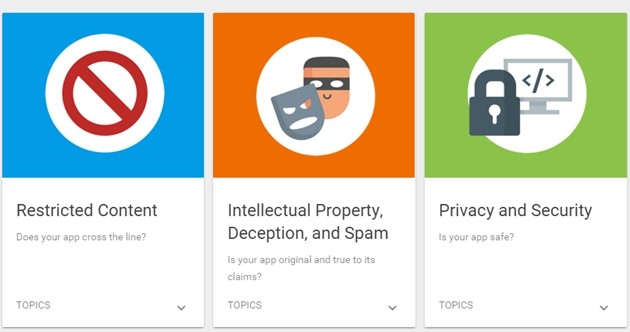
Google, on Wednesday unveiled new changes to its Developer Program Policy Center, and also rolled out a brand new material design facelift.
All of the policies are now organized into seven categories. Each category has a colorful icon and a drop-down menu to reveal the included topics.
Categories are organized into restricted content, intellectual property and spam, privacy and security, monetization and ads, store listings, enforcement, and updates.
Advertisement
One of the most notable changes is an update to the ads policy, which now prevents developers from incorporating ads which interfere with the use of an app.
Another notable change for developers is a new requirement that prevents apps from attempting to bypass system power management features.
Below is an example of what your apps should not do if you want it to be accepted in the Google Play Store:
“Apps that block or interfere with another app displaying ads.
Advertisement
Game cheating apps that affect the gameplay of other apps.
Apps that facilitate or provide instructions on how to hack services, software or hardware, or circumvent security protections.
Apps that access or use a service or API in a manner that violates its terms of service.
Apps that attempt to bypass system power management that are not eligible for whitelisting.”
Another change to the User Data Policy also restricts apps that collect contact information, such as names and phone numbers, from a user’s address book.
Advertisement
Google is granting a 30-day period to developers and businesses to unpublished or fix their app. Anyone caught breaking the new rules after then risks having their app permanently removed from the Play Store.
However, Google has decided that in-browser ad blockers are quite alright, so Android users will still be able to download apps like Adblock Fast, Adblock Browser, and Brave Browser.


